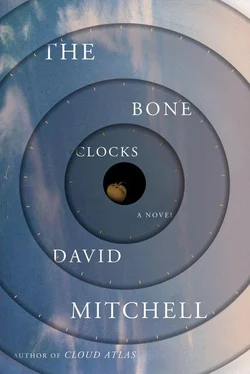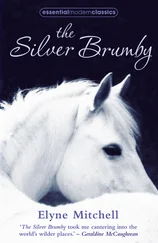“Sharp knife is better than voodoo.” She scowls. “Milk or Coffee-mate in your coffee, like you drink it at Came-bridge University?”
“White coffee brings me out in a nasty rash.”
“So if— if —I find you real Brazilian coffee, you drink?”
“Mariângela. Once you’ve tasted the real thing, everything else is a cheap imitation.”
“NEAR THE END now, Brigadier,” I tell the old man, and turn the page. “ ‘But for me all the East is contained in that vision of my youth. It is all on that moment when I opened my young eyes on it. I came upon it from a tussle with the sea — and I was young — and I saw it looking at me. And this is all that is left of it! Only a moment; a moment of strength, of romance, of glamour — of youth!.. A flick of sunshine upon a strange shore, the time to remember, the time for a sigh, and — goodbye! — Night — Goodbye …’ ” I slurp lukewarm coffee: Brigadier Philby’s cup remains untouched. The vital, witty man I knew five years ago is one and the same as the wheelchair-bound husk. Back in 1986 he was seventy going on fifty, living in a big old place in Kew with his devoted widowed sister, Mrs. Hatter. The brigadier was an old friend of my headmaster, and although I was supposed to be mowing his lawn while his broken leg recovered, he recognized a kindred spirit and we ended up spending my civics-class hours on poker, cribbage, and blackjack. Even after his leg had healed I’d go round most Thursday evenings. Mrs. Hatter would “fatten me up” and we’d retire to the card table, where he taught me ways to “Entice Lady Luck to drop her bloomers” that not even Toad guesses at. A dapper dresser and quite the ladies’ man in his day, an obsessive philatelist, linguist, and raconteur. After a glass of port he would talk about days in the Special Boat Section in wartime Norway, and later in the Korean War. He insisted I read Conrad and Chekhov, and taught me how to get a fake passport by finding a name in a graveyard and writing off to Somerset House for a birth certificate. I knew this but pretended I didn’t.
Brigadier Philby hardly stirs nowadays. His head sways now and then, like Stevie Wonder’s at the piano, and dandruff gathers in the furrows of his jacket. His shave was done by a male nurse with a mind on other matters and the old man wears an incontinence nappy. A few malformed words escape the brigadier’s mouth from time to time, but he’s otherwise nonverbal. I’ve no idea whether Conrad’s Youth is bringing him the pleasure it used to, or whether it’s a torment to be reminded of happier days. Or perhaps he has no idea what I’m saying, or even who I am.
Still. Mariângela says that the best way to work with dementia is to act as if the person you knew is still inside the wreckage. If you’re wrong, and the person you knew is gone, then no damage is done but the standards of care stay high; if you’re right, and the person you knew is still bricked up inside, then you are the lifeline. “On to the final page, now, Brigadier. ‘By all that’s wonderful it is the sea, I believe, the sea itself — or is it youth alone? Who can tell? But you here — you all had something out of life: money, love — whatever one gets on shore — and, tell me, wasn’t that the best time, that time we were young at sea; young and had nothing, on the sea that gives nothing, except hard knocks — and sometimes a chance to feel your strength — that only — what you all regret?’ ”
Something flutters in the brigadier’s throat.
A sigh? Or just air, strumming vocal cords?
Through a gap in the trees at the end of the garden I see the Thames, silver and gunmetal.
A five-man boat flits from left to right. Blink and you miss it.
The flat-capped gardener gathers leaves with a rake.
Last paragraph in the dying light: “ ‘And we all nodded at him: the man of finance, the man of accounts, the man of law, we all nodded at him over the polished table that like a still sheet of brown water reflected our faces, lined, wrinkled; our faces marked by toil, by deceptions, by success, by love. Our weary eyes looking still, looking always, looking anxiously for something out of life, that while it is expected is already gone — has passed unseen, in a sigh, in a flash — together with the youth, with the strength, with the romance of illusions.’ ”
I shut the book, and put on the lamp. My watch says 4:15. I rise, and draw the curtains. “Well, sir.” It feels like I’m addressing an empty room. “I shouldn’t tire you out too much, I guess.”
Unexpectedly, the brigadier’s face tautens with alertness and his mouth opens, and although his voice is ghostly and stroke-slurred, I can discern his words: “My … bloody … stamps …”
“Brigadier Philby — it’s Hugo, sir. Hugo Lamb.”
His shaky hand tries to clutch my sleeve. “Police …”
“Which stamps, Brigadier? Which do you mean?”
“Small … fortune …” Intelligence enters his eyes and, for a moment, I think he’s ready to fire off an accusation, but the moment goes. In the corridor outside, a trolley squeaks by. The brigadier I knew has left his bombed-out face, leaving me alone with the clock, shelves of handsome books nobody ever reads, and one certainty: that whatever I do with my life, however much power, wealth, experience, knowledge, or beauty I’ll accrue, I, too, will end up like this vulnerable old man. When I look at Brigadier Reginald Philby, I’m looking down time’s telescope at myself.
MARIÂNGELA’S DREAM-CATCHER SWINGS when I biff it, and I find my lover’s crucifix among her boingy curls. I hold the Son of God in my mouth, and imagine him dissolving on my tongue. Sex may be the antidote to death but it offers life everlasting only to the species, not the individual. On the CD player, Ella Fitzgerald forgets the words to “Mac the Knife” one broiling night in Berlin over forty summers ago. A District Line train rumbles down below. Mariângela kisses the fleshy underside of my forearm, then bites, hard. “Ow,” I complain, enjoying the pain. “Is that Portuguese for ‘the Earth moved for me, my lord and master, how was it for you?’ ”
“Is Portuguese for ‘I hate you, you liar, you cheat, you monster, psycho, pervert, go to rot in the hell, you son of the bitch.’ ”
My erect bishop is unburying itself; the anticipation makes us both laugh, which squishes me out prematurely. I rescue the condom before its gluey viscera stains her purple sheets, and wrap it in a tissue shroud. Coupling is frenzy; decoupling is farce. Mariângela squirms around to face me and I wonder why women are uglier once they’re unpeeled, encrusted, and had. She sits up and sips some water from the glass guarded by Jesus of Rio. “You want?” She brings the glass to my lips. Mariângela guides my hand over her heart: Love love love love love love love , it beats.
Ah, I should have listened to Hugo the Wise …
• • •
“YUGO, WHEN CAN I meet your family?”
I’m putting on my boxers. I’d like a shower, but the Aston Martin dealership is closing soon so I need to hurry. “Why do you want to meet my family?”
“Is normal I want. We see each other six months now. June twenty-first, when you come here first. Tomorrow is December twenty-first.”
God, an anniversary counter . “Let’s go for a meal to celebrate, Angel, but let’s leave my family out of it, hey?”
“I want meet your parents, your brothers …”
Right: Mum, Dad, Nigel, Alex; may I present Mariângela. She hails from a nondescript suburb of Rio, works at Riverside House as a geriatric nurse, and after visiting Brigadier Philby, I shag her scarlet. So: What’s for dinner? I find my T-shirt down the side of her bed. “I don’t really take girlfriends home, to be honest.”
Читать дальше












